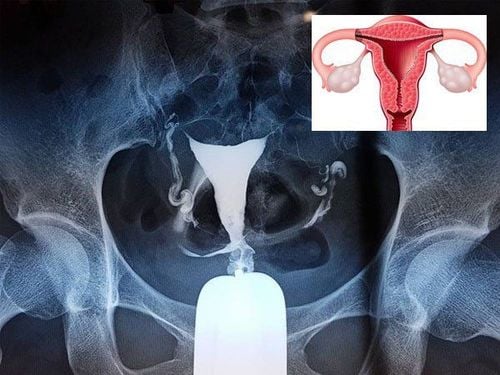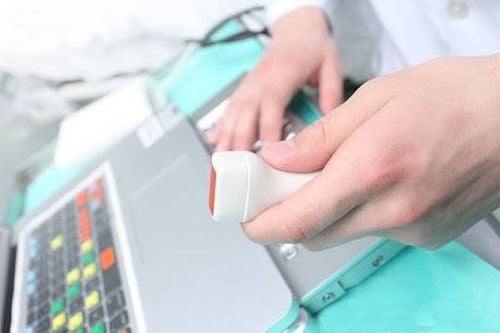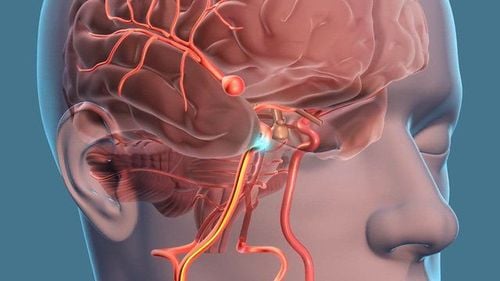This is an automatically translated article.
The article is professionally consulted by Master, Doctor Trinh Thi Phuong Nga - Radiologist - Department of Diagnostic Imaging and Nuclear Medicine, Vinmec Times City International Hospital.Mesenteric infarction is a dangerous disease that, if not treated promptly, can lead to death. Therefore, it is necessary to diagnose mesenteric infarction early for active intervention and treatment. So, mesenteric infarction is diagnosed by what medical technique?
1. Overview of mesenteric infarction
Mesenteric infarction is a condition in which blood flow is blocked in the blood vessels that nourish the mesenteric organs including the liver, stomach, small intestine and large intestine. Due to poor blood circulation, blood clots can form and damage organ function here.Mesenteric infarction can be acute or chronic, insidious or sudden. Acute mesenteric infarction is usually caused by a blood clot that travels to one of the mesenteric arteries and suddenly obstructs blood flow. These blood clots usually originate from the heart, and are common in patients with cardiovascular disease or an irregular heartbeat. Chronic mesenteric infarction is usually caused by atherosclerosis, which reduces blood flow through the arteries. The artery is narrowed by plaque, reducing blood flow, or causing a complete blockage.
Symptoms of the disease include:
Sudden severe abdominal pain: Acute mesenteric infarction can cause sudden, severe abdominal pain, sometimes accompanied by nausea and vomiting; Severe abdominal pain after eating: Chronic mesenteric infarction usually causes severe abdominal pain 15 to 60 minutes after eating. The pain can last up to 2 hours, tending to recur after each meal. The person may also experience nausea, vomiting, bloating, or diarrhea; Weight loss: Chronic mesenteric infarction sometimes causes weight loss because patients tend to eat less than usual to avoid postprandial abdominal pain. Mesenteric infarction is a dangerous disease. If not treated in time, the disease can cause complete blockage of the arteries, causing bowel necrosis, intestinal perforation, sepsis, irreversible intestinal damage, and even death.

2. Medical techniques to diagnose mesenteric infarction
Medical techniques to diagnose mesenteric infarction are as follows:X-ray of the abdomen upright: This method is of high value in early diagnosis of intestinal obstruction or perforation so that doctors can timely surgically intervene in the patient. ; Ultrasound: A screening imaging test for the diagnosis of chronic mesenteric infarction. However, the test results depend on the doctor's qualifications, the amount of gas in the intestine and the patient's condition; Doppler ultrasound: A non-invasive test that evaluates blood flow to the intestines to determine if blood vessels are narrowed or blocked; CT - scan: The slices of CT with intravenous contrast injection and visualization, 3D reconstruction have high value in evaluating mesenteric infarction, checking for abnormalities if any of the mesenteric vessels. suspension and small intestine. Many studies prove that CT - scan has a sensitivity of 96 - 100% and a specificity of 89 - 94%. In patients with acute mesenteric infarction, CT scan helps to evaluate mesenteric artery or vein thrombosis, intestinal gas, intestinal wall thickening, mesenteric venous gas, ascites, bowel dilatation, and pneumothorax. peritoneum and solid organ infarction. Abdominal CT scan with intravenous contrast is of choice if mesenteric venous thrombosis is suspected with sensitivity greater than 90%; MRI: Helps provide accurate images of the mesenteric vascular system, used to diagnose chronic mesenteric infarction. However, MRI should not be used as an emergency first-line test due to time constraints; Image noise due to intestinal peristalsis.... Vascularity: Considered as a diagnostic criterion for acute arterial occlusion due to its sensitivity of 74 - 100% and specificity of 100%. The angiogram shows abrupt occlusion of the superior mesenteric artery without reperfusion - sensitivity is close to 100% in cases of acute embolism. With this diagnostic technique, the doctor can choose the most appropriate treatment for the patient. However, this is an invasive method, so it is not suitable for patients with severe disease who are not ready to perform surgery. In addition, the use of intravenous contrast agents can also be toxic to the kidneys. At the same time, angiography also has a relatively high false-negative rate in the early stages of the disease. However, if there is a high suspicion of acute mesenteric infarction, angiography is still of the highest diagnostic value. In case of suspected mesenteric vein thrombosis with a history of increased blood clots, angiography is not indicated, but abdominal CT scan is recommended. In addition, it is necessary to differentiate mesenteric infarction from the following conditions: abdominal aortic aneurysm, cholecystitis, acute appendicitis, biliary system inflammation, gallstones, myocardial infarction, acidosis by lactic acidosis, pancreatitis, small bowel obstruction, large bowel obstruction, kidney stones, shock, or decreased blood flow.

Currently, Vinmec International General Hospital has been and continues to be fully equipped with modern diagnostic facilities such as: PET/CT, SPECT/CT, MRI, X-ray, ultrasound, tests to perform Currently examining and diagnosing medical conditions, including mesenteric infarction. The entire examination process at Vinmec is performed by a team of experienced and qualified medical professionals, so the results are accurate, and the patient has the opportunity to receive early treatment to ensure long-term health.
For more information on diagnostic techniques for mesenteric infarction, customers can contact Vinmec International General Hospital for service.
Please dial HOTLINE for more information or register for an appointment HERE. Download MyVinmec app to make appointments faster and to manage your bookings easily.














